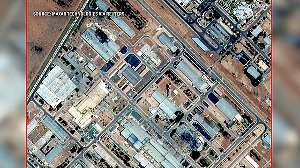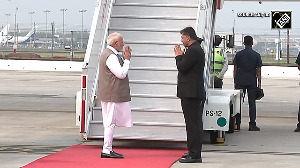In a landmark development, King Abdullah has appointed Norah al-Faiz as deputy minister with special responsibility for female education. She will report to Prince Faisal bin Abdullah, who has been appointed as the education minister.
This is the first time that a woman has been appointed to the government in the orthodox Islamic kingdom.
"This is a successful step. We've always suffered from having a man occupy the position," the US-educated Norah al-Faiz told the Arab News daily soon after her appointment. "A woman knows what problems and challenges her peers face. It's a change for the better."
Change, notes The Telegraph newspaper of London, is not a common phenomenon among the Saudi ruling elite where the foreign minister, Prince Saud al-Faisal, has been in office since 1975, and the defence minister, Crown Prince Sultan, has held his job since 1964.
What made these appointments even more piquant was the dismissal, alongside, of two hardliners over last weekend.
Sheikh Ibrahim al-Ghaith, head of the religious police, the Mutawwa, who routinely harass citizens in their pursuit of 'promoting virtue and preventing vice', has been sacked, as has been Sheikh Salih Ibn al-Luhaydan, head of the Saudi judiciary who famously declared last year that owners of satellite channels beaming material he deemed 'immoral"' could be murdered as per law.
Abdul-Aziz bin Humain will succeed Sheik Ibrahim al-Ghaith as head of the Commission for the Promotion of Virtue and the Prevention of Vice, which runs the Mutawwa, while Saleh bin Humaid, who till last weekend served as the head of the Consultative Council, the closest thing the kingdom has to a parliament, will succeed al-Luhaydan.
Among other changes, former Saudi ambassador to Lebanon, Abdul-Aziz al-Khojais the information minister, reports the Saudi Press Agency, while Abdullah al-Rabia, a surgeon who has carried out about a dozen surgeries separating conjoined twins, will be health minister. King Abdullah has also replaced the head of the central bank and made some fresh appointments in the judiciary.
This is the first major shakeup in the kingdom since the elderly Abdullah came to power in August 2005, and is considered significant as it eases, however lightly, the vice-like grip hardliners have had on the levers of power. The new lot the king has brought in are said to be younger and more aware, if not accepting, of cultural Islam's diversity.
'The bring not only new blood but also new ideas,' reacted Jamal Khashoggi, editor of Al-Watan newspaper. 'They are more moderate and many are also close to the king's reform agenda, having worked closely with him.'
These changes, welcome as they are, are merely a drop in the vast ocean, note observers. A woman may have been appointed minister but it's true that women have little or no freedom of action in the kingdom -- they are not even allowed to drive, for instance.
Minister or not, Norah al-Faiz will still have to take the permission of her closest male relative to travel or undergo surgery. And she also cannot vote.






